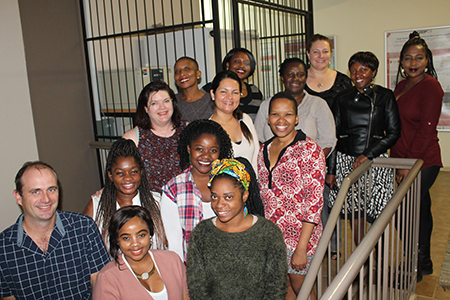A large number of cosmetic products that are produced by micro and small businesses in Africa have not been cosmetically tested. This increases the chances of using a cosmetic product that has the potential to do more harm than good.
The Department of Science and Technology (DST) / North-West University (NWU) Preclinical Drug Development Platform (PCDDP) has since established that there is a great need for educating entrepreneurs on how they can go about ensuring that their products are tested and safe to use.
The PCDDP recently collaborated with the Southern Africa Network for Biosciences (SANBio) and brought 12 female entrepreneurs in the cosmetics industry to attend the FEMBIObiz cosmetic workshop, a first of its kind for South Africa.
Some of the entrepreneurs who attended the five-day-long workshop on the NWU’s campus in Potchefstroom came from as far as the Seychelles, Botswana, Namibia and Zimbabwe.
Cosmetic information for entrepreneurs
The workshop consisted of a number of sessions that were conducted by PCDDP staff, Elmarie Erasmus from the cosmetics company Golden Rewards, and Quintin Verloop from LycoDerm Compounding Pharmacy in Centurion.
The 12 entrepreneurs received important information regarding the various formulation types and pitfalls, claims for cosmetic products, how to test for the various claims, the design of a cosmetic extraction or manufacturing facility, and the implementation of a quality assurance system for the cosmetic product development.
According to Prof Anne Grobler, director of the DST/NWU PCDDP, these entrepreneurs walked away with a solid understanding of the development pipeline of a cosmetic product.
“This workshop will enable them to implement the knowledge they gained in the development of their products. Now they also have a better understanding of the importance of facility, quality and regulatory requirements when manufacturing or procuring cosmetic products,” says Prof Grobler.
Onneile Khwene, the founder of Moritelo Natural Care and one of the workshop delegates, said she was extremely excited to attend the workshop since the next step for her business is to manufacture cosmetics and supplying it to big franchises. ”I can only supply to these big chain stores once my product has been clinically tested, and this workshop will steer me in the right direction.”
Prof Grobler foresees this workshop taking place on an annual basis, with the possibility of having advanced-level workshops and a digital course for the theoretical parts.
“We will maintain contact with these entrepreneurs. We will follow their progress, assist with future product development and commercialisation activities,” says Prof Grobler.
“We aim to become a cosmetic knowledge referral centre for African entrepreneurs in the cosmetic, body care and natural product sectors.”

Here are the 12 female entrepreneurs who attended the FEMBIObiz cosmetic workshop. In the front with them is Quintin Verloop from LycoDerm Compounding Pharmacy who presented some of the sessions.
